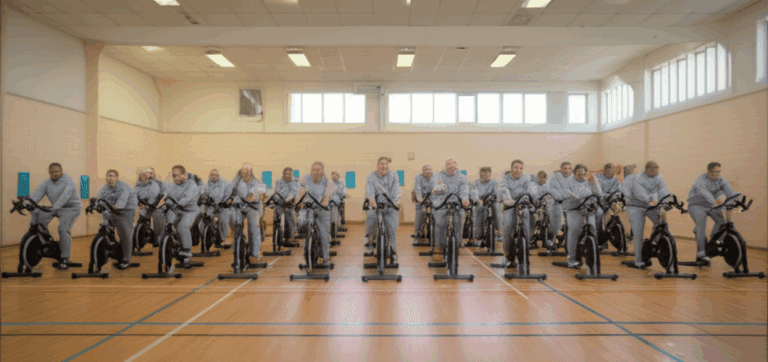In an inspiring initiative promoting mental health awareness, over 60 inmates at Low Moss Prison near Glasgow participated in a unique cycling challenge. The prisoners collectively “cycled” the length of Great Britain by pedaling on exercise bikes, racking up an impressive 874 miles. This event, organized during Men’s Mental Health Awareness Week, aimed to highlight the importance of well-being and provide a positive outlet for the inmates.
Cycling for a Cause: Mental Health Awareness
The event saw participants taking turns on 15 exercise bikes, each cycling for an hour. To add an extra layer of challenge, they paused every four minutes to perform 11 push-ups. In total, the prisoners completed approximately 10,000 push-ups alongside their cycling efforts.
Scott Isaksen, a physical training instructor with 15 years of experience in the Scottish Prison Service, led the exercise sessions. He incorporated music and instructions to create an engaging atmosphere. “It was to create a common goal,” Isaksen explained. “We had 15 people at a time, doing 17 miles each, for four hours. And to make it a little harder, I added the push-ups.”
The Impact of Exercise on Mental Health
For many inmates, the gym provides a crucial environment for maintaining their mental well-being. One participant shared, “Being behind a locked door is difficult; you have a lot of time to think. Your mental health can deteriorate rapidly here. It’s good to get to the gym; it’s a good environment.” He further emphasized the positive impact of exercise on his own mental state, stating, “I would not be the same guy without the gym… I was a shell of a man before I came here. I cannot speak highly enough of this place and what they did for me.”
The importance of fitness and mental health within the prison environment is widely recognized. “We know this supports mental and physical health,” stated one official. “It’s heavily important to the running of this prison and the health of those who live here.”
Addressing Health Behind Bars
The event also included an information corner set up by the NHS, offering leaflets, snacks, and sign-up sheets for general check-ups. Helen, who organized the information corner, emphasized the importance of men taking care of their health, even while incarcerated. “They need to know how to manage conditions they have and keep themselves healthy,” she said. “They may be in prison, but they can still care about their health and well-being. It’s good for them to know that.”
Barlinnie’s Bike Project: Skills and Community Support
In a separate initiative, prisoners at HMP Barlinnie in Glasgow are participating in a program that repurposes donated bikes into high-quality cargo bikes. This project, called Beyond Bars Cargo, is a collaboration with St Paul’s Youth Forum (SPYF). The prisoners gain valuable skills by dismantling and rebuilding the bikes, and 100% of the profits from the sales are reinvested back into the local community.
SPYF On Bikes, a social enterprise of St Paul’s Youth Forum, operates a bike shop in Hogganfield Loch. Every penny of profit is reinvested into the local community through the charity’s work, which focuses on cycling, education, food, and community connections. The organization distributes free bikes, offers repairs, teaches cycle safety, and promotes inclusive cycling with adaptive bikes.
Neil Young, CEO of St Paul’s Youth Forum, expressed his passion for supporting communities and alleviating transport poverty. “At SPYF, we are passionate about supporting communities to flourish, and the launch of SPYF On Bikes and Beyond Bars Cargo is a really exciting point in furthering our mission to alleviate transport poverty in Blackhill and make it easy for everyone to choose to cycle,” he said.
Stuart Bale, a prison officer at HMP Barlinnie, highlighted the benefits of the bike workshop for the prisoners. “It gives guys the opportunity for purposeful activity,” he explained. “What I find is we get a much better relationship with the prisoners.”
Rick Baxter, the active manager for On Bikes at St Paul’s Youth Forum, emphasized the skills that the inmates are learning through the program, including bike maintenance and frame building.
Cycling as Rehabilitation
These initiatives demonstrate the potential of cycling-related activities to contribute to prisoner rehabilitation, promote mental and physical well-being, and support community development. By providing opportunities for skill development, exercise, and community engagement, these programs offer valuable pathways for prisoners to rebuild their lives and contribute positively to society.







